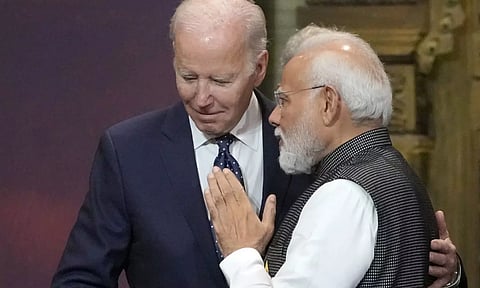

Indian liberals set themselves up for disappointment when they expected PM Modi to come back chastened from his state visit to the US. It was at best a forlorn hope that the Biden administration would put its geopolitical strategic interests aside and counsel Modi against the authoritarian agenda he is implementing at home.
As it turned out, the closest Modi came to being questioned about the ways of his government was when he was asked, at the customary joint press conference with the US President, whether he planned to do better by the Muslims of his country. It was the toughest question Modi has faced in a media interaction since he was asked how he likes to have his mangoes. Yet, it was not the toughest question that might have been asked of him.
That would have to be about the cavalier way his government has brushed aside constitutional proprieties, silenced the opposition and the media, and now gives every indication of wanting to redefine the basic nature of the state. Minority protection and human rights are but two of the questions that arise from this tendency.
All the same, Modi threw a surprise by ignoring the question about minority rights and turning it into one about India’s democratic creds. For someone who’s said to be timorous in the face of the media, his response was surprisingly bold, even if it had been rehearsed. “Do you have to even ask?” he began in his trademark mocking tone. “America and India are united by the fact democracy is in our DNA.”
Curiously, in Biden’s prefatory remarks just minutes earlier, he had spoken in the same vein, using the DNA metaphor, to draw a contrast between his country’s relationship with India and its attitude to China. He went on to indicate why India was now being invited to occupy the space once allotted to China in US calculations. Considering that the questions asked at the conference were pre-vetted, it is reasonable to surmise that the responses were pre-rehearsed too. If so, it would be sound to infer also that the US has no reservations about the Modi government’s democratic credentials and no qualms about doing business with it.
Pragmatism is of course the currency of international relations even if the language is lofty. Former US President Barack Obama said as much in his widely quoted interview with Christiane Amanpour when he said American presidents have to remember that they have ‘business to do’ while nudging tyrants towards democracy. That was exactly what Modi’s state visit to the US came down to. America geopolitical strategy for the 21st century is to ring China in the Indo-Pacific, and India’s participation, lying bang in the centre of this theatre, is necessary for it to work. For now, the US chooses to look the other way.
Despite all the media criticism, the protests at the White House, and the boycott of Modi’s speech by a few US congressmen, Modi returns from the US with the satisfaction of being courted by the world’s lone superpower, and successfully de-hyphenating India from Pakistan in the eyes of the Americans. But then of course, we risk becoming hyphenated to the Chinese.
To India’s liberals, this should bring about the sobering realisation yet again that the defence of India’s democracy can at best get lip service from foreigners. The real battle can only be fought by Indians.